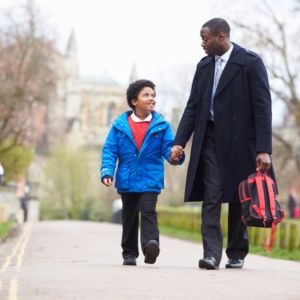Getting dressed
Putting on clothes is a skill. It requires both big and small movements.
Buttons and zips can be difficult for small fingers.
Help your child to get dressed by choosing school uniform that is easier to get on and off. For example, elasticated waists for trousers or skirts.
Get them to practice putting it on and taking it off before their first day. Be sure to plan extra time in the morning to reduce stress.
Practice putting shoes on the correct feet. Draw half a smiley face inside each shoe to help children with their left and right. Comfortable shoes which fit are important. Velcro or buckles are easier than laces. For PE, trainers support the feet more than plimsoles.
Ready for lunch
Children will need to be able to feed themselves using a knife and fork and sat at a table. Get your child used to this by eating as a family at the table. Get them to practice cutting up food. Get them to carry their own plate and clear it away.
To support your child to eat well offer new foods in different forms (raw or cooked, sticks or slices, smooth or lumpy). This will help your child to learn to like a range of different food.
It is normal for toddlers to refuse to eat or be a fussy eater. Make sure you give them the right portion size for them.
Children should only drink plain water or unflavoured milk to keep their teeth healthy.
Your child should be drinking from a proper cup. Make sure they are having about 6 to 8 drinks every day.
All children in Reception, Year 1 and Year 2 can have a free school lunch.
If you are on benefits your child may be eligible for free school meals throughout school. You need to apply through your local council. If your child is eligible for free school meals, they’ll also qualify for the Holiday Activity and Food Programme. Food vouchers may also be available through the Household Support Fund. Find out more by contacting your local council.
Read our Healthy Eating page for more information.
Going to the toilet
Your child should be wearing cotton pants through the day at school. Some children with complex needs may take longer to be dry during the day. Some children will not be dry at night when they go to school. This is normal.
Start toilet training as soon as your child shows signs they are ready. It requires time and patience.
Give your child plenty of encouragement and praise when they are dry. Don’t get cross or let your child see your frustration when they have an accident.
If they have an accident change them in the bathroom. This helps them learn where they should be going. Encourage them to wipe properly themselves from front to back using toilet paper. Teach them to wash their hands with soap and water. You can use (not food) rewards, for example stickers when toilet training.
If you need help contact your health visitor.





